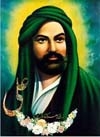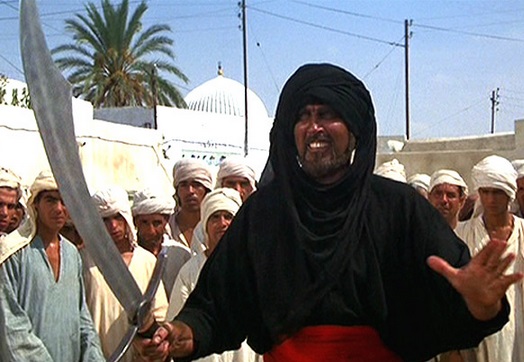More from Aswat al-`Iraq on the spike in Mahdism there:
"Messianic Cults in Iraq, an Increase in Numbers
and Expansion"
"...extremist violent Shiite groups, such as the Soldiers of Heaven and Ansar Ahmad Al-Yamani
(Supporters of Ahmed Al-Yamani), began appearing in Iraq after April of 2003....these movements have mutual points
of similarity. They are all Shiite, refuse to accept any political or religious clergy other than their leaders, they all
have extremist beliefs that reject the current situation in Iraq, and they adopt violent approaches as means of changing the
situation. In addition, they all try to recruit young, ignorant, socially neglected Shiites that have strong ties to the Shiite
religious communities....Some analysts attribute this phenomenon to the vague principle of the (rescuer or salvager),
and the absence of any Shiite education concerning Imam Al-Mahdi, while other researchers see that poverty and bad economic
circumstances in Iraq were the catalysts behind the creation of these groups....The movement of Ahmad bin Al-Hassan
Al-Yamani appeared in Iraq in 2004, before other similar extremist Shiite groups, and it depends on two ideas; one
being that Al-Yamani is the son of Imam Al-Mahdi, and the other is that Al-Yamani is the latest representative of Imam Al-Mahdi
who will make the necessary preparations for Al-Mahdai's appearance....In 2007, as that researcher confirmed to VOI,
Al-Yamani followers became very active in Basra, where they held a book fair inside a big tent that they established at the
center of that city. In their books and leaflets that were distributed in that fair, Al-Yamani followers clearly said that
Ahmad bin Al-Hassan Al-Yamani is the son of Imam Al-Mahdi, but neither the provincial nor the religious authorities in Basra
interfered....reports say that Ahmad bin Al-Hassan Al-Yamani practices a process of brainwash on his followers, by showing
them some extraordinary acts, "Perhaps he uses magic to convince people who do not believe him," the researcher
speculated....
(complete story: http://www.aswataliraq.info/look/english/article.tpl?IdLanguage=1&IdPublication=4&NrArticle=67432&NrIssue=2&NrSection=4).
Observations:
1) The Iraq Study Group must have had intelligence reports about these burgeoning
movements when they were writing their report, which was disseminated 12/06. But despite at least three
years of such movements, NOTHING was said about them. Good job, Jim Baker. Let's just pretend that such strongly-held
messianic ideas don't exist in Islam (because we don't like them or think they make Muslims look "fanatical.")
2) The common characteristics of these groups make it unlikely they will participate in any political settlement in Iraq.
3) If "al-Yamani" is eliminated, some other John the Baptist-type, Mahdist precursor will walk onstage--much
like happened with previous Mahdist outbreaks elsewhere in Islamic history, particularly in French-occupied Algeria in
the 19th century.
4) Mahdists' "magic" can often be attributed to their powerful charisma, so we should
not dismiss this aspect of these movements too lightly.
The momentous Mahdist movements erupting in Iraq might not be glowing on the radar screens of U.S. government analysts--although
they SHOULD be--but in the region they're all the rage. One of my contacts, a medical doctor in Baghdad,
informs me that one of these movements' leadership asked for a convocation of all Shi`ite groups' leader in Iraq,
and that such is being worked out and will be broadcast on al-Sharqiya TV there (
http://www.alsharqiya.com/display.asp?fname=iqmainstory). The independent Iraqi news site Aswat al-`Iraq reported last week that "Iraqi newspapers devoted most of their
pages on Wednesday to the bloody clashes that broke out in southern Iraq between security forces and the self-styled
Ansar
Ahmad al-Yamani, lashing out at whom they described as promoters of false doctrines....the government-funded al-Sabah
newspaper quoted security officials as claiming ties between 'the terrorist groups that killed Iraqis in Basra and Nassiriya'
and 'foreign groups aiming at spreading chaos and assassinating religious clerics and government officials.'
Ansar
Ahmad al-Yamani, or Supporters of Ahmad al-Yamani, is a strict religious organization whose members, active in some southern
provinces such as Basra, Thi Qar and Missan, believe that Yamani is one of the ambassadors of Imam al-Mahdi, the 12
th
Messiah-like holiest figure for Shiite Muslims....nearly 97 civilians, security men and gunmen were killed and 217 others
wounded during clashes that erupted between police forces and the self-styled
Jund al-Samaa, or Soldiers of Heaven,
in central Basra. The leader of the Shiite group was also reported to be killed during the incidents. Security officials say
that
Ansar Ahmad al-Yamani and the
Jund al-Samaa are one and the same, while National Security Minister
Shirwan al-Waili denies any relation between the two. The Soldiers of Heaven is a Shiite armed group that clashed with Iraqi
policemen in al-Zarka area, near the holy province of Najaf, in late 2006. The group was then accused of attempting to control
Najaf and kill clerics there....Meanwhile, the independent daily al-Raay al-Aam (Public Opinion) published an article entitled
'Distorting symbols between
Jund al-Samaa and
Ansar al-Yamani.'
'The appearance of the
Mahdi claiming groups has become frequent in Iraq, particularly in the month of Muharram (The first Hijri month in
the Islamic calendar). Last year's
Jund al-Samaa incidents caused a media uproar when some Arab and Iraqi satellite
channels defended the group members and blamed the mishandling of the situation on the government,' the newspaper wrote.
'The same scenario was repeated this year in other areas of the country, which poses several significant questions about
these groups' financiers and masterminds,' the newspaper added" (
http://www.aswataliraq.info/look/english/article.tpl?IdLanguage=1&IdPublication=4&NrArticle=67040&NrIssue=2&NrSection=1).
The Iranian government has weighed in on these movements, as well, via its mouthpiece "The Tehran Times:"
"On the second day of the lunar month of Muharram while the residents of al-Toairij were preparing to mourn the third
martyred Shia Imam 20 kilometers from his shrine in Karbala, a middle-aged man wearing a green turban

with a long beard dressed up to resemble a saint, was addressing his followers in a date garden. The deceitfully dressed Ahmad
Ismail Kamel known as Ahmad al-Hassan al-Yamani claimed to be in contact with and receiving instructions from the 12th Shia
leader, the hidden Imam Mahdi (AS)....He urged his companions who were armed with automatic rifles to be prepared for the
'Day of Cry' (Yaum al-Sihah). Hassan al-Yamani's followers believe the first Friday of Muharram is called the
'Day of Cry' on which a universal voice is reverberated throughout the globe and that the true companions of Imam
Mahdi (AS) must be prepared for 'Red Friday'. The cult maintains all pilgrims of the Holy Shrine of Hussein (PBUH)
must be massacred on 'Red Friday' in order to set the stage for the reappearance of Imam Mahdi (AS). Hassan al-Yamani,
who was addressing his followers urging them to kill any and all pilgrims with a firm hand, suddenly stopped in mid-sentence
to inspect the premises. He was shocked when he realized Iraqi security forces had surrounded the garden, leaving him no escape
route.
Upon entering the garden, Iraqi forces found numerous 'David Stars' with Qur'anic verses inscribed
on them. In his confessions, al-Yamani revealed he had some 5,000 disciples in Basra, Samaveh and Najaf and that his cult
was funded by one of the 'rich Persian Gulf littoral states'.
Yamani alleged that this Arab state spends a large
sum of money to promote superstition and create sectarian conflict in Iraq....Not long ago the previous leader of the cult
Dia Abdul-Zahra known as Abu Kamar was killed in Najaf while trying to upstage the assassination of the city's Shia clerics.
Before he was killed on January 29, 2007, Abu Kamar claimed to be the reincarnation of the first Shia Imam and the son of
Imam Mahdi (AS)....But who benefits from the existence of such cults and their activities? It is plain simple that cults such
as these with sophisticated propaganda machines cannot be funded by Iraqi sources. The prime suspect could be perhaps one
of the foreign powers which has a background in 'divide and rule' policies. It is no secret that many seek to undermine
and marginalize the mainstream Shia clerics who have played a decisive role in Iraq's political arena since the fall of
Saddam; what better way to do this than to support such cults?" (
http://www.tehrantimes.com/index_View.asp?code=162291)
Observations:
1) The Iraqi government is either confused about the nature of these
various movements, or is pretending to be (because they're embarrassing? because Iran is involved? because supporters
thereof are in the government?)
2) The Iraqi and Iranian governments ostensibly want to blame these Mahdist
groups on foreign powers, with the latter being most transparent about whom they see as responsible: those nefarious
Zionists ("David Stars" being found in the vicinity) or one of the Persian Gulf Arab states, probably Saudi Arabia.
3) Note that Aswat al-Iraq admits that these movements have "become frequent in Iraq." Over a year
ago I critiqued the Iraq Study Group report [see the archives on this site] for failing to take Mahdism in
the region seriously. Well, those eschatological chickens are coming home to roost now. Let's hope the so-far-successful
surge can survive full-blown Mahdism.
